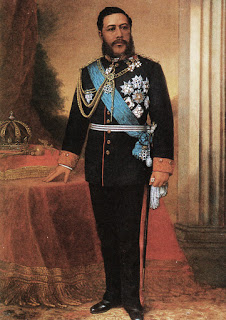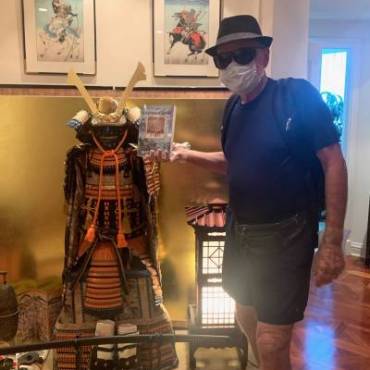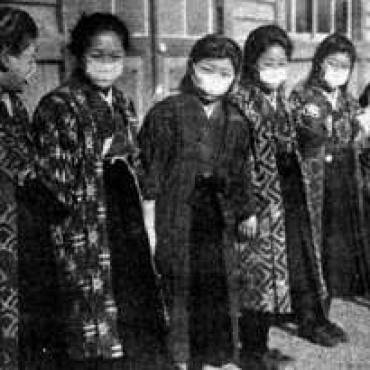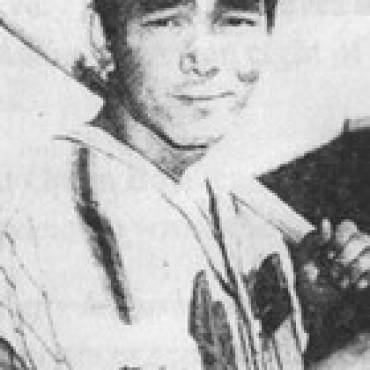A King’s Visit – Chapter 1
On the March 4, 1881 cloudless sunrise, Hawaii’s seventh King, David Kalakaua stood on the Oceanic’s upper deck looking at the snow-coned majesty of Mount Fuji as the British steamer eased into Yokohama’s crowded horseshoe-shaped harbor. So much depended on this trip: the survival of his kingdom, the very survival of his race. The missionaries’ descendants had taught him races disappear. Where were the Canaanites and Philistines today or any of the warring tribes who had vied for supremacy in the Levant? All stripped of their separate identity by hordes of invaders while only the Jews had stayed intact.
Worried that not a single ship would welcome him on what had been leaked as a “private visit,” the king, nonetheless, agreed to the ship’s captain’s request to fly his royal flag. As a midshipman yanked the pulley hoisting the king’s colors, the Oceanic crossed abreast a Russian ironclad. The warship’s single cannon retort startled the monarch. His eye riveted on the Russian ship coming alive with sailors rushing to the decks in formation facing his passing ship. The Russian cannon commenced a twenty-one gun salute in three second interludes. But what caused the lump in Kalakaua’s throat was the unfurling of the Hawaiian flag on the mainmast. Then, the Japanese, French, British, and American warships followed in sequence until two hundred and seventy three single volleys ended the cannonade concert. Kalakaua gripped the railing. Perhaps my audacious gamble will pay off.
As the cordite smoke and fumes of the now silent cannon cleared, the wind blew the trumpet and drum sounds of John Philip Sousa’s “The Salutation March,” across the bay. The king recognized his favorite composition. How did they know?
“Look,” said William Armstrong, standing on Kalakaua’s left. Hawaii’s diminutive attorney general, and for this trip, the Royal Commissioner of Immigration, leaned on the ship’s railing and pointed to a Japanese naval launch approaching the Oceanic. An imposing figure in full royal regalia stood in the open bridge flanked by two Caucasian men in dark suits and panama hats.
“That’s my counsel, Robert Irwin,” said the king recognizing the man whom he had never met by his picture. Who are the other men?
That would be Admiral Natamuta,” said the raw cigar voice of the ship’s captain behind them. “He is talking to D. W. Stevens, Secretary of the American Legation.
Kalakaua kept his smile, but now forced. Why, he thought, is an American official part of the welcoming party? Of course, he answered his own question, to remind king and emperor of America’s special relationship to my threatened country.
“Charles,” said Kalakaua, showing none of his disquiet over the American welcome while turning right to face portly Charles H. Judd, his chamberlain, “Perhaps this welcome means we will receive a full hearing of our proposals.”
“Your Majesty, I believe this is a bigger reception than General Grant received on his world tour two years ago,” said Judd.
“A good omen,” voiced Kalakaua nodding to the approaching admiral as he thought that while he and his Americans cabinet ministers shared a common cause to reverse Hawaii’s dwindling population, their purpose differed. They, to bolster their plantation empires; he, to save a kingdom.
“Let’s descend to the lower deck to greet the emperor’s envoy,” said Kalakaua.
Minutes later, as the welcoming delegates made their way over the gangplank connecting the two ships, the King strode to greet them. Judd put out a restraining arm, garnering a withering scowl from his monarch. Realizing he had overstepped his bounds—and in public too—Judd bowed, saying, “Your Excellency, it would be better that you let them come to you. You are a King.”
The dark face, so dark his detractors spread rumors that the King’s grandmother had lain with one of the runaway slaves who had made it to Hawaii before the Civil War, donned a pursed smile to mask his anger. While King Kalakaua dominated his minders in height and girth, he struggled to do as well in the great game of who dominated his kingdom. “All the more reason to make the gesture, Charles. Perhaps, a king is allowed to show his appreciation for such a warm welcome without demeaning his crown. Stay here.” And glancing over at Armstrong, added, “Both of you.” With that, he moved to the gangplank as the admiral stepped on board.
“Greetings, Your Most High Excellency,” said Natamuta. “On behalf of Emperor Mutsuhito, Japan is honored to welcome you as the first head of state to visit our kingdom in our two thousand year history. Our emperor’s brother humbly invites you to stay at his cottage as his guest.”
“Such an unexpected privilege overwhelms me,” replied Kalakaua.
After the king exchanged greetings with Irwin and Stevens, Natamuta pointed to junior officers, “My retainers will attend to your luggage.” When his majesty is ready, my launch will take you ashore.
When, after breakfast on the Oceanic, they boarded the launch. Upon reaching the banner flapping laden pier, Kalakaua strolled regally through a smartly uniformed honor guard to the bandstand surrounded by a Hawaiian and Japanese flag-waving throng. Once in place, the band struck up the Japanese national anthem. To Kalakaua’s surprise, the band segued to a flawless rendition of the Hawaiian national anthem celebrating the memory of the great King Kamehameha who had united the various Hawaiian petty kingdoms almost a century ago. Tears blossomed in the King’s eyes. He had written the verses his kingdom’s national anthem only five years earlier.
Irwin leaned into the king’s ear. “A missionary wife, who until a year ago lived in Hawaii, sent me the sheet music.”
When the band finished, Natamuta led the king to a horse drawn carriage that carried the two along with the king’s delegation to the Prince Higashi Fushiminomiya’s summer home where he welcomed Kalakaua. “The Emperor and Empress request an audience with Your Excellency at the palace tomorrow in Tokyo.”
“I am honored,” said Kalakaua thinking how this invitation must be parlayed to protect his crown and to address the shrinking numbers of his race. He had a surprise proposal he had not shared with his advisors.
Charles Judd on the left; William Armstrong on the right
A King’s visit – Chapter 2
Prince Higashi Fushiminomiya’s summer home Yokohama 8PM
King David Kalakaua eyed his three haole advisors. “The emperor’s warm reception humbles me.”
“Your excellency,” said Irwin, the king’s representative to the Chrysanthemum throne, “We have a treaty with Japan. As a nation coming out of feudal isolation and wishing to be accepted into the ranks of a modern state, Japan wants to show the world they understand the protocol obligation of its treaties.”
“May I add,” said Attorney General William Armstrong. “Small we might be, but our location is critical. We are the only developed port within thousands of miles. The only nation between Japan and America.”
Chamberlain Charles Judd wiped his white linen napkin across his lips. “Instead of speculating why our welcome exceeded our expectations, we should be planning how we use the emperor’s hospitality to further our purpose.”
Kalakaua and his advisors were sharing a quiet French meal replete with delicate sauces and wine pairings at the Emperor’s brother summer palace. Though Japanese in architecture and graced with a Japanese garden, the palace’s interior boasted European furnishings worthy of Versailles.
“The Chinese are destroying the island, R.W,” continued Judd addressing Irwin by his preferred moniker. “They never bring any women with them, so they take Hawaiian wives—or worse, have children without the benefit of marriage. Those people are never satisfied. Instead of renewing their contracts after the mandatory three years of labor, they migrate to town and set up their own businesses. How they save money on three dollars a month working the cane fields I can’t fathom. But they do.”
“And the way they do business in their Chinatown,” said Armstrong with a disgusted shake of his head, “is patently unfair. They live like rats so they can afford to undercut the wh…uh…local community, the very people who have lifelong stakes in the prosperity of the islands.”
Following a muffled burp, Judd said, “They own a quarter of the retail shops and half the restaurants.”
“The legislature,” said Armstrong “passed a law forbidding importing any more Chinese without women, but when our recruiters left Canton, their passengers were almost all men.”
“And you allowed them to land?” asked R. W, looking at the King.
Judd intercepted the question. “What could we do? We are desperately short of labor.”
A servant entered holding an open Spanish cedar cigar box. He approached the king. “Would your excellency like to retire to the drawing room?”
“Ah, a Ramon Allones. Havana’s finest,” said Kalakaua in an approving voice.” Selecting a cigar from the box and running it over his nose, he charged, “to the drawing room.” A bottle of Cognac and four snifters waited on a Chinese inlaid table displaying a tiger descending a cloud shrouded mountain. Burning wood crackled in the fire place.
Except for the king, the men seated themselves on red upholstered, stiff-backed Burgat armchairs. Kalakaua strolled over to the right side of the simmering fireplace. He reached down with his free hand, grabbed a log from the brass rack and placed it in the fire. He turned to face the trio. “As I addressed my favorite Kawaiiahau congregation on the eve of our departure, my earnest desire is for the perpetuity of the crown and the permanent independence of the people of Hawaii. Thus, the object of my Japan mission is to introduce a healthy population of foreign immigrants who will intermarry and repopulate my native race.” He looked directly at Irwin. “Your dispatch indicated that the Japanese are poor, and if given a chance to immigrate, many would do so.”
Irwin nodded affirmatively. “In addition your excellency, the military conscription regulations exempts the first born to maintain the family.” Pausing for effect, Irwin continued, But if first born goes overseas, the second born is exempt.”
“Gentlemen,” said Kalakaua, “The Japanese do not trust us. They remember the unhappy experience of the first laborers recruited to Hawaii.” Pointing his unlit cigar at Irwin, he added, “And your report states they abhor the coolie status of the Chinese in Hawaii and the Indians in Fiji.”
“Yes, Your Excellency. The Japanese are a proud people.”
Kalakaua smiled. He stood a little taller and, one by one, looked each man in the eye. “Based on the greeting we have received on this our first day, I believe the Japanese emperor will seek my friendship as a fellow Pacific royal. If we build amity … if he trusts me…then, R. W, that would make your easier?”
“Of course, your Excellency.”
“You wonder whether this could be done on a short visit? The key to building trust gentlemen is seeing this from the other man’s side. What is it that we could offer?”
“Jobs for their poorer class,” said Armstrong.
“Ah, William, if that carrot were but good enough, R.W. would already be sending boatloads of Japanese to Hawaii. Here is what I have in mind.”
The three haoles listened in earnest. Despite their reservations about the American and British reaction to the King’s proposal, they agreed his overture had merit.
A great boom exploded outside. The chief servant entered the room. “The emperor has honored you with a fire works display. Perhaps you want to step outside.
Another sign thought Kalakaua as he led his delegation to veranda now lit with sky works exploding over Yokohama’s harbor.
A King’s Visit Chapter 3 – The Unexpected Gift that leads to Japanese immigration to Hawaii.
Yokohama to Tokyo 11AM March 5
General Prince Arisugawa, who led the emperor’s armed forces in both the 1868 Boshin War restoring the emperor as ruler and then again in 1877 squashing the Satsuma rebellion, greeted the Hawaiian delegation the next morning. Next to him, stood a handsome, young man still in his teens, dressed in a perfectly tailored blue and white navel uniform.
“Your Excellency,” bowed the young man, “I am Prince Yamashina Sadamaro. I will act as your interpreter and guide for most of your visit.”
Once more, an honor guard stood at attention, this time from the summer palace to the Yokohama train station. Once in the carriage, Kalakaua addressed the general. “Japan has earned the respect of the world by making so much progress in so few years. I must admit to feeling a bit of envy.”
The older prince gave a small shake of his head. “Despite progress since the restoration, we are a fearful nation. We must build up our resources.”
“But certainly over the past fifteen years, Japan has become strong,” protested Kalakaua.
“I’m afraid we remain vulnerable. Look at China and India. Ancient civilizations. Yet, one has been relegated to a colony, and the other, who gave us Buddhism and a written script, has lost two wars to Britain in my lifetime.” He did not have to explain his reference to the Opium Wars of 1842 and 1858. “In China’s case, their very capital was captured and looted by the English. Their ports are controlled by the great powers.”
Tokyo Palace 2PM
The Emperor and King, each adorned in medallion laden military uniforms, stood side by side in the Palace’s throne hall. The Emperor, more Mongolian in complexion than his royal peers, owned an open face with a forehead set high. His lively, confident eyes gave evidence that since he had ascended his throne half a lifetime ago, he had outgrown his regents. He was taking charge of his empire. If the forty-year-old Polynesian king of a country of less than 100,000 people in the presence of a leader of 37,000,000 was intimidated, the towering Kalakaua did not show it.
At the agreed prompt, the men turned to each other and bowed half way to the waist. A soft murmur arose, when for the first time in 2,000 years, a Japanese emperor shook hands. Then, Mutsuhito presented Kalakaua with a Bible in Japanese as an expression of thanks from a church built with Hawaiian donations. Kalakaua accepted the gift, and at a signal, took the elevated royal seat next to Mutsuhito. The palace protocol had been forewarned that the King’s gift would be “intangible” and best given as he sat next to the Emperor.
The King, first glancing at his regal peer and then turning his head straight ahead to address the gathered dignitaries, spoke is slow, booming tones. “As you know, your Excellency, in 1871, in the third year of your reign, our two kingdoms signed a treaty of friendship including a ‘most favored nation’ clause.”
The room’s murmurs silenced. The emperor’s retainers exchanged nervous glances. While the Japanese Imperial Household had little experience with visiting foreign dignitaries, they had been assured no political discussion would take place at an opening reception, following their centuries-old precedent.
Kalakaua continued. “Since the European powers had imposed a clause giving them extraterritorial privileges where foreigners controlled the courts in designated ports and thus removing their nationals from Japanese laws and courts, we were granted the same rights. Our own country also suffers under the yoke of such unequal treaties negotiated from the power of gunboats.”
Only the gentle rustle of clothing could be heard as the princes, admirals, and generals shifted position, hoping to get a better look at this protocol-breaking visitor. The King took pleasure at the response, marveling at how well today’s reality mirrored his fantasy of the night before. He had stayed awake for hours practicing getting the words just right and envisioning the hoped-for approbation. Even the court interpreter, unable to maintain his rigid stance in the face of such drama, leaned forward in anticipation of his next words.
“Your Majesty, the warm reception from the people of Japan compels me to reject a treaty condition we ourselves find objectionable. We Pacific peoples must grow to be good friends. Good friends do not seek any advantage or special privilege that we would not extend to the other.”
The King turned his neck to face his regal peer. “Therefore, if it pleases His Majesty, I am directing my counsel to begin negotiations on a new treaty.”
The Japanese hated the extraterritorial clauses that the 1858 treaties—imposed on them by the great powers who threatened military action if a weak Japan did not assent—as an insult to their national dignity. They had seen the end game of these clauses in China. The first objective of their industrial and military modernization was to put the country in a position to negotiate with the great powers just such a treaty as Kalakaua presented. The King’s unexpected gift was beyond anything the Emperor could have expected.
Mutsuhito gave a slight head bow to the Hawaiian monarch, stood and addressed the assembly. “This is a glorious day.” The Meiji Emperor clapped his hand gently. The room followed suit. While the applause lingered, the emperor bowed, and in Imperial voice said, “Until this evening.”
Breaking another taboo, Kalakaua stood and leaned forward. In a voice just loud enough for the interpreter to hear, he said, “If it pleases the emperor, I would wish a word with your majesty this evening without my counselors.” Mutsuhito paused only long enough for Prince Sadamaro to translate. Ignoring the previous advice of his counselors to avoid any meeting without his advisors present, the emperor spoke softly. “An excellent idea.”
King Kalakaua caught the eye of a triumphantly smiling Armstrong. Yes, thought Kalakaua, you can see that this gift assures us of a sympathetic hearing for our request for immigrants. Kalakaua’s imperial countenance gave no hint of his hours-away diplomatic foray to change the dynamics of both empires. He was all too aware that his haole advisors, whose sole duty was presumed to serve their king and his kingdom, had their own agenda—that of Hawaii’s annexation to America. Well, two can play the dual agenda game.






2 Comments
The starting relationship of Japan and Hawaii was not something I had knowledge of. The information of European Royalty and politics, policies and consequences, was very interesting. Now is there some fictional accounts regarding details or is it researched and historical ?
History is fascinating and I have developed a high regard for it from studying Japanese Samurai Swords and Japans early history with warfare and politics. Thank you for your wonderful literature.
Mahalo, Love and Aloha, Al Furuto
Greetings Al,
The story of King Kalakaua’s 1885 is historical. I spent time at the Bishop Museum taking notes that King made of that trip. My other primary source is the book “Around the World with a King” written by William Armstrong, a member of Kalakaua’s cabinet who accompanied the king on the trip Each man had a different objective …but needed each other. Since you are a history buff with interest in Japan, I am sending you a note on my novels to your message box. Aloha, Mike
Add Comment